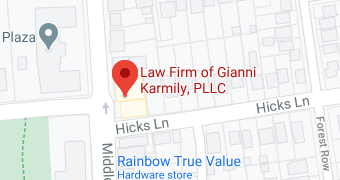Long Island Lawyer Representing Clients Accused of Committing Misdemeanor Crimes in Nassau County
Every criminal offense is classified as a misdemeanor or felony crime in New York. The most serious crimes are classified as felonies, but that doesn’t mean that misdemeanor charges should be taken lightly. Being convicted of a misdemeanor can have a negative impact on every aspect of your life. Don’t jeopardize your freedom—seek legal representation from misdemeanor crimes lawyer Gianni Karmily as soon as possible.
What Are the Different Classes of Misdemeanor Crimes on Long Island?
There are two different classes of misdemeanor crimes in New York: class A and class B misdemeanors. Class A misdemeanors are the most serious misdemeanor offenses. These crimes are just one step down from a felony offense. Some examples of class A misdemeanors in New York include:
- Aggravated harassment in the second degree
- Arson in the fifth degree
- Computer tampering in the fourth degree
- Assault in the third degree
- Theft of services
- Criminal trespass in the second degree
- Criminal possession of a controlled substance in the seventh degree
- Endangering the welfare of a child
- Welfare fraud in the fifth degree
- Unlawful fleeing a police officer in a motor vehicle in the third degree
A class B misdemeanor is not as serious as a class A misdemeanor. This type of crime is considered one step above a violation, which is the lowest level of criminal offense. Some examples of class B misdemeanors include:
- False impersonation
- Prostitution
- Public lewdness
- Issuing a bad check
- Harassment in the first degree
- Stalking in the fourth degree
- Conspiracy in the sixth degree
- Unlawful dealing with a child in the second degree
- Sexual abuse in the third degree
If you are facing class A or class B misdemeanor charges, it’s in your best interest to speak with attorney Gianni Karmily at once.
What Are Unclassified Misdemeanor Crimes?
There are some misdemeanor offenses that are not classified as either class A or class B misdemeanors. These criminal offenses are known as unclassified misdemeanor crimes. Some examples of unclassified misdemeanors include:
- Reckless driving
- Driving with a suspended license, or aggravated unlicensed operation (AUO)
These crimes are just as serious as other misdemeanor crimes even though they do not fall under class A or class B crimes.
What Are the Penalties For Misdemeanor Crimes?
The penalties for a misdemeanor crime will vary depending on a number of factors, including the classification of the offense. If you are convicted of a class A misdemeanor, you may face a maximum of one year in jail or three years of probation as well as up to $1,000 in fines. If you are convicted of a class B misdemeanor, you may face a maximum of three months in jail or one year of probation (three years of probation for public lewdness) as well as up to $500 in fines. The penalties may differ slightly for some misdemeanor crimes. For example, if you are convicted of class A misdemeanor sexual assault, the probation period may last for six years rather than three.
The penalties for an unclassified misdemeanor can vary depending on the offense. But in general, the law states that you cannot be sentenced to more than one year in jail for a misdemeanor conviction.
Why Should You Hire An Attorney to Fight Misdemeanor Charges?
Many people believe that they won’t need an attorney because misdemeanor charges are not serious. But if you are convicted of a misdemeanor crime, you will have a criminal record that follows you for the rest of your life. Having this conviction on your record could impact employment opportunities, your reputation, and other areas of your life. Jail time is also a possibility if you are convicted of a misdemeanor.
Misdemeanor charges will not go away if you ignore them. The only way to beat these charges—and avoid the penalties of a conviction—is to hire an experienced criminal defense attorney. Let misdemeanor offense lawyer Gianni Karmily protect your rights and help you clear your name.
Book A Case Evaluation With Our Nassau County, Long Island Misdemeanor Crime Attorney Today
Have you been charged with a misdemeanor? Fight back with the help of criminal defense attorney Gianni Karmily at Law Firm of Gianni Karmily, PLLC. Gianni has dedicated his career to helping people accused of committing misdemeanors and felonies fight for their freedom. Let him aggressively pursue the best possible outcome in your case. To schedule a case evaluation regarding your case, call 516-630-3405 or fill out the form on this website.





